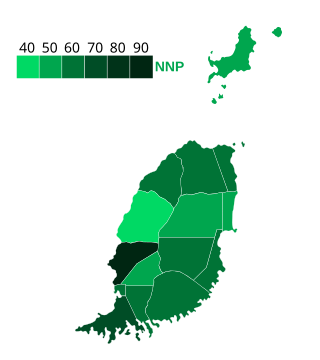The electoral threshold, or election threshold, is the minimum share of all the votes cast that a candidate or political party requires to achieve before they become entitled to representation or additional seats in a legislature. This limit can operate in various ways, e.g. in party-list proportional representation systems where an electoral threshold requires that a party must receive a specified minimum percentage of votes, either nationally or in a particular electoral district, to obtain seats in the legislature. In single transferable voting, the election threshold is called the quota and it is possible to pass it by use of first choice votes alone or by a combination of first choice votes and votes transferred from other candidates based on lower preferences. In mixed-member-proportional (MMP) systems the election threshold determines which parties are eligible for top-up seats in the legislative body.
Vote splitting is an electoral effect in which the distribution of votes among multiple similar candidates reduces the chance of winning for any of the similar candidates, and increases the chance of winning for a dissimilar candidate. This is commonly known as the spoiler effect, which can discourage minor party candidacies.

The Social Democratic Party is a centre-left political party in Estonia. It is currently led by Lauri Läänemets. The party was formerly known as the Moderate People's Party. The SDE has been a member of the Party of European Socialists since 16 May 2003 and was a member of the Socialist International from November 1990 to 2017. It is orientated towards the principles of social-democracy, and it supports Estonia's membership in the European Union. From April 2023, the party has been a junior coalition partner in the third Kallas government.

The National Democratic Congress (NDC), also known as the National Democratic Congress of Grenada, Carriacou and Petite Martinique, is a social democratic and centre-left political party in Grenada. It is the governing party in Grenada, having won a majority in the 2022 general elections. The party is led by current prime minister Dickon Mitchell as of October 2021.

A perennial candidate is a political candidate who frequently runs for elected office and rarely, if ever, wins. Perennial candidates are most common where there is no limit on the number of times that a person can run for office and little cost to register as a candidate.

Elections in Benin take place within the framework of a multi-party democracy and a presidential system. Both the President and the National Assembly are directly elected by voters, with elections organised by the Autonomous National Electoral Commission (CENA).
Elections in Malaysia include elections to public office of the political entities that since 1963 have composed the federation of Malaysia. At present, elections in Malaysia exist at two levels: federal level and state level. Federal level elections are those for membership in the Dewan Rakyat, the lower house of Parliament, while state level elections are for membership in the various State Legislative Assemblies. The heads of executive branch at both the federal and state levels, the Prime Minister and Menteri Besar/Chief Ministers respectively, are usually indirectly elected, filled by a member of the majority party/coalition in the respective legislatures.

Chiam See Tong is a Singaporean retired politician and lawyer who served as the Secretary-General of Singapore Democratic Party (SDP) between 1980 and 1993 and Secretary-General of Singapore People's Party (SPP) between 2011 and 2019 and the chairman of Singapore Democratic Alliance (SDA) between 2001 and 2011. He was the de facto Leader of the Opposition when he became the Member of Parliament (MP) for Potong Pasir Single Member Constituency (SMC) and served between 1984 and 2011.
An independent, non-partisan politician or non-affiliated politician is a politician not affiliated with any political party or bureaucratic association. There are numerous reasons why someone may stand for office as an independent.

The Northern Territory Greens are a green party in the Northern Territory, a member of the federation of the Australian Greens party. It is the only branch of the Australian Greens to have never had any parliamentary representation, as well as the only one that does not run candidates in every single seat. The party is the most progressive registered party in the Northern Territory.

The Social Democratic Party (SDP) is a political party in the United Kingdom, established in 1990. The current party traces its origin to the Social Democratic Party, which was formed in 1981 by a group of dissident Labour Party Members of Parliament (MPs) and former Cabinet members Roy Jenkins, David Owen, Bill Rodgers and Shirley Williams, who became known as the Gang of Four. The original SDP merged with the Liberal Party in 1988 to form the Liberal Democrats, but Owen, two other MPs and a minority of party activists formed a breakaway group also called the Social Democratic Party (1988–1990) immediately afterwards. That continuing party dissolved itself in the aftermath of a by-election in Bootle, in which the party's candidate received fewer votes than Screaming Lord Sutch's Official Monster Raving Loony Party. However, some SDP activists met and voted to continue the party in defiance of its National Executive, leading to the creation in 1990 of the current Social Democratic Party under the leadership of the candidate who lost that by-election. The party has been led since 2018 by William Clouston.
Parliamentary by-elections in the United Kingdom occur when a Member of Parliament (MP) vacates a House of Commons seat during the course of a parliament.

The Glasgow Queen's Park by-election, 1982 was a parliamentary by-election held on 2 December 1982 for the House of Commons constituency of Glasgow Queen's Park.

General elections were held in Grenada on 18 January 1999. The governing New National Party of Prime Minister Keith Mitchell was re-elected after winning all 15 seats. Voter turnout was 56.5%.

The Grenada United Labour Party (GULP) is a political party in Grenada.

General elections were held in Samoa on 4 March 2011, to determine the composition of the 15th Parliament. Two parties contested the election, the ruling Human Rights Protection Party (HRPP), which had been in power for most of the time since 1982, led by Prime Minister Tuilaʻepa Saʻilele Malielegaoi and the newly founded Tautua Samoa Party (TSP) led by Vaʻai Papu Vailupe, which several minor parties had merged into. The election occurred following amendments to the electoral act in 2009, including the introduction of the Monotoga law, a requirement for aspiring candidates to dedicate traditional village service and commitments. As a result, three TSP aspiring candidates, including a challenger for the prime minister's seat, were disqualified by the Supreme Court for failing to satisfy this law.

The Grenada Renaissance Party is a political party in Grenada. It contested the 2003 general elections, but received only six votes and failed to win a seat. It also ran three candidates in the 2013 general election receiving 20 votes.
The 1920 Woodbridge by-election was held on 28 July 1920. The by-election was held due to the resignation of the incumbent Coalition Unionist MP, Robert Francis Peel. It was won by the Coalition Unionist candidate Sir Arthur Churchman.
The Yorkshire Party is a regionalist political party in Yorkshire, a historic county of England. The party, which was founded in 2014, campaigns for the establishment of a devolved Yorkshire Parliament within the United Kingdom, with powers over education, environment, transportation and housing.

General elections were held in Barbados on 24 May 2018. The result was a landslide victory for the opposition Barbados Labour Party (BLP), which won all 30 seats in the House of Assembly, resulting in BLP leader Mia Mottley becoming the country's first female Prime Minister. The BLP's victory was the first time a party had won every seat in the House of Assembly. Previously, the most one-sided result for a Barbadian election had been in 1999, when the BLP won 26 of the 28 seats. The BLP's 73.5 percent vote share was also the highest on record.













